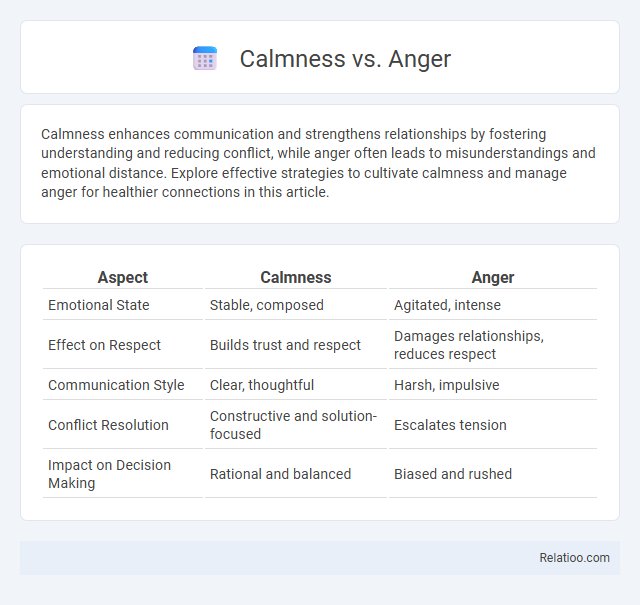Calmness enhances communication and strengthens relationships by fostering understanding and reducing conflict, while anger often leads to misunderstandings and emotional distance. Explore effective strategies to cultivate calmness and manage anger for healthier connections in this article.
Table of Comparison
| Aspect | Calmness | Anger |
|---|---|---|
| Emotional State | Stable, composed | Agitated, intense |
| Effect on Respect | Builds trust and respect | Damages relationships, reduces respect |
| Communication Style | Clear, thoughtful | Harsh, impulsive |
| Conflict Resolution | Constructive and solution-focused | Escalates tension |
| Impact on Decision Making | Rational and balanced | Biased and rushed |
Understanding Calmness and Anger
Understanding calmness involves recognizing your ability to remain composed and clear-headed during stressful situations, which enhances decision-making and emotional balance. Anger activates the body's fight-or-flight response, often impairing rational thinking and escalating conflicts. Cultivating calmness allows you to manage anger effectively, leading to healthier communication and improved mental well-being.
The Science Behind Emotional Responses
Your brain's amygdala plays a crucial role in triggering anger by detecting threats and activating the fight-or-flight response, releasing stress hormones like adrenaline and cortisol. In contrast, calmness involves the prefrontal cortex regulating emotional reactions, promoting rational thinking and reducing physiological arousal. Understanding these neural mechanisms helps you manage emotional responses and maintain mental well-being during stressful situations.
Effects of Calmness on Mental Health
Calmness significantly improves your mental health by reducing stress hormones such as cortisol, promoting emotional stability and clarity of thought. It enhances cognitive function, allowing better decision-making and improved focus, while also fostering resilience against anxiety and depression. Practicing calmness regularly supports neuroplasticity, leading to long-term benefits in mood regulation and overall psychological well-being.
Consequences of Anger on Well-being
Anger triggers increased stress hormones like cortisol, negatively impacting your cardiovascular health and immune system. Prolonged anger can lead to chronic anxiety, depression, and disrupted sleep patterns, reducing overall mental well-being. Maintaining calmness supports emotional balance and physical health by lowering blood pressure and enhancing cognitive clarity.
Triggers: What Sparks Calmness and Anger?
Triggers for calmness often include mindfulness practices, deep breathing, and positive affirmations, which help regulate your emotional state by reducing stress hormones like cortisol. Anger, conversely, is typically sparked by perceived injustices, frustration, or unmet expectations, activating the amygdala and releasing adrenaline that heightens emotional reactivity. Understanding these triggers allows you to cultivate calmness intentionally and manage anger responses more effectively.
Calmness vs Anger in Decision Making
Calmness in decision making enhances clarity, reduces cognitive bias, and supports rational evaluation of options, leading to more effective and thoughtful outcomes. Anger often impairs judgment by triggering impulsive reactions, elevating emotional bias, and narrowing focus to immediate concerns rather than long-term consequences. Balancing these emotional states is crucial, as calmness promotes strategic thinking while anger can either motivate action or cause detrimental risks in critical decisions.
Strategies to Cultivate Calmness
Strategies to cultivate calmness include mindfulness meditation, deep breathing exercises, and progressive muscle relaxation, which help regulate emotional responses and reduce stress levels. Cognitive reframing techniques enable individuals to shift negative thought patterns, promoting a more tranquil mental state. Incorporating consistent physical activity and maintaining a balanced sleep schedule further support emotional stability and resilience against anger triggers.
Managing and Channeling Anger Constructively
Effective anger management involves recognizing emotional triggers and practicing techniques such as deep breathing, mindfulness, and cognitive reframing to channel anger constructively. Maintaining calmness enhances decision-making, reduces stress, and fosters positive communication in personal and professional relationships. Developing emotional intelligence skills helps transform anger into motivation for problem-solving and personal growth.
Social Impact: How Calmness and Anger Affect Relationships
Calmness fosters trust, effective communication, and emotional resilience in relationships, promoting long-term social harmony and cooperation. Anger, when unmanaged, often leads to conflict, misunderstandings, and emotional distancing, undermining social bonds and increasing stress. Maintaining calmness during disagreements enhances conflict resolution skills and strengthens interpersonal connections, benefiting overall social well-being.
Choosing Calmness Over Anger: Practical Tips
Choosing calmness over anger enhances your mental clarity and emotional resilience, leading to better decision-making and healthier relationships. Techniques like deep breathing, mindful meditation, and pausing before reacting help you manage triggers and maintain composure. Developing this skill reduces stress-related health risks and promotes long-term well-being.

Infographic: Calmness vs Anger
 relatioo.com
relatioo.com